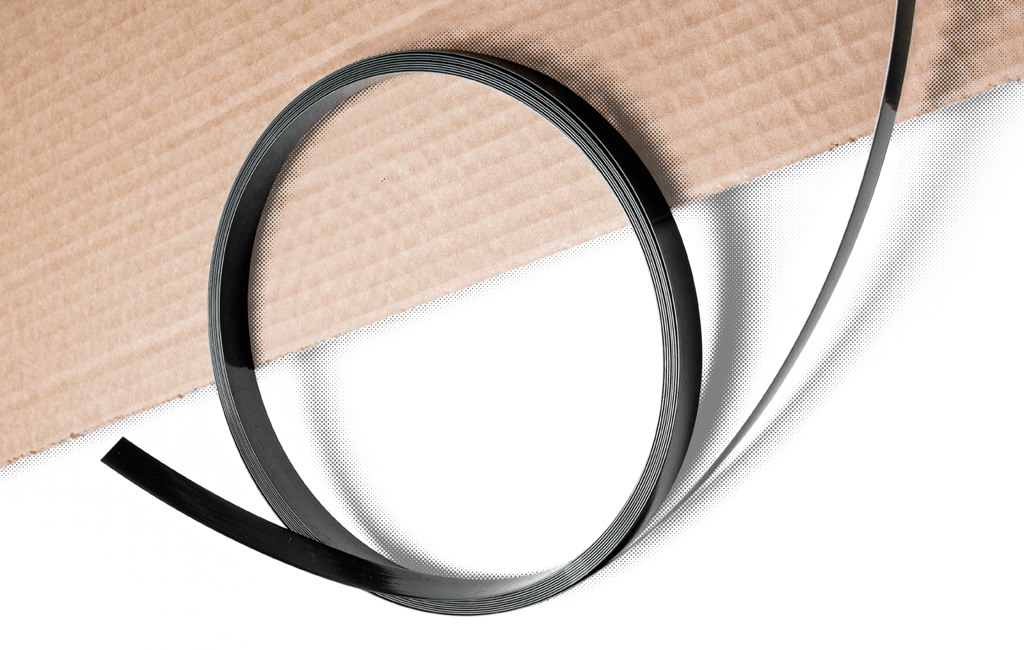The postman rings and hands over a parcel. The customer takes a pair of scissors and cuts through the black plastic straps, which end up in the trash. Though these straps are something we take for granted and barely notice, strapping (as it is called in the packaging industry) products poses many challenges. For example, when a do-it-yourselfer buys a bundle of roof laths, he is pleased to see that they are bound together tightly. But that is not to be taken for granted; the wood is strapped while still moist after cutting and dries out quickly in a hardware store environment. That results in shrinkage, and then perfect tensioning in the strapping begins to matter. “Our strapping machines are often used in the food industry, where they have to withstand temperatures of minus 20 degrees Celsius in cold stores, or salt water from fish processing,” says Michael Zimmermann, Sales Manager for Germany, Austria and Switzerland at Mosca GmbH.
The company is based in Waldbrunn in Germany’s Odenwald region and is the leader in strapping technology. It produces both the strapping material and machines used with it. The company’s largest volume comes from strapping machines for temporary strapping during industrial processes — strapping that normal consumers never see. “For example, corrugated cardboard gets strapped up to five times during its production process.”
Wanted: an economical jack-of-all-trades

There are 18 drives installed in the machine, but only five different mechanical designs.
Mosca is particularly proud of its latest strapping machine for corrugated cardboard, the UCB, which is representative of Mosca’s creative approach: The machines need to be versatile but remain in the specified price range. After all, customers expect optimum value for money. “We have to implement customer requirements like high-precision positioning or high computing power even with relatively simple components,” says Markus Haas, who heads the electrical design department. Servomotors or large amounts of memory are much too expensive for these tasks, so Mosca needs alternative concepts. “That’s the ‘spice’ in our work, but of course it also makes life difficult for us.”
The electrical engineers sometimes reached their limits, especially when dealing with the movements of the numerous axes in the machines, as Rainer Ihle, a developer, can attest. “Our dream was to avoid using pre-parameterized motors,” he says. “If we use a specially parameterized motor for all of the different tasks, then we have a huge variety of drives in a machine. But there used to be no other way.”
“We have to implement customer requirements like high-precision positioning or high computing power even with relatively simple components.”
Markus Haas, Head of the electrical design department at Mosca
That made it difficult not only to control the drives, but also to service them. Once the Mosca technician at the scene had identified the type of drive that was faulty, the search began in Waldbrunn for the right PC tool, the interface adapter, the parameterization and the current version of the firmware. The technicians would then customize the replacement drive and send it to the customer. Then the technician was deployed for the second time, to install the replacement drive. “In the worst case, that sometimes meant the machine was out of service.”
An electrifying solution
A solution came into view when Markus Haas became acquainted with the K4 drive regulator at a presentation of the ebm-papst drive portfolio. “It electrified me, and right away I asked the sales representative who had told him what we need. That was exactly the solution we had been looking for.” The regulator provides speed, torque and position control, is configurable and is enabled for communication via RS-485 bus system. The Mosca team’s dream of electronically neutral installation was almost within reach.
But a few creative solutions were still needed on the software side. For example, to make the drives work with other components in the same bus system. Since the different components do not communicate identically, a sort of translation is needed for different “dialects” of data transmission. Through an assigned address, every drive always knows whether it or another is being addressed and what is to be done.
In a pilot project, the team overcame other obstacles on the way to the perfect drive solution. Armed with that knowledge, they began to work on the implementation of the new UCB. “We can only implement our solutions with our experienced development team,” says Haas.
The result simplifies handling in general, and also the machine’s architecture. Function assignments for the drives can be made at runtime, and their integration in the Mosca bus system also enables condition monitoring. In addition, the new UCB’s control box is only a quarter as large as the one on the predecessor machine — with identical functionality. That has many benefits, such as access to the machine.
“There are 18 drives installed in the UCB, but only five different mechanical designs. That’s ideal, because a service technician can easily take them along on a service call.”
Daniel Treu, electrician at Mosca
And service calls are reduced to a few hours, as electronics technician Daniel Treu enthusiastically reports: “There are 18 drives installed in the UCB, but only five different mechanical designs. That’s ideal, because a service technician can easily take them along on a service call.” When installed, a drive is automatically addressed, parameterized and given the correct firmware when the machine is switched on; it is automatically customized for the function to be performed.
The Mosca team is happy about more than just the solution. As Michael Zimmermann says, “By April we had already sold the quantity we had planned for the entire year, and the customers aren’t giving back our prototypes because they work so well.”

Leave a comment